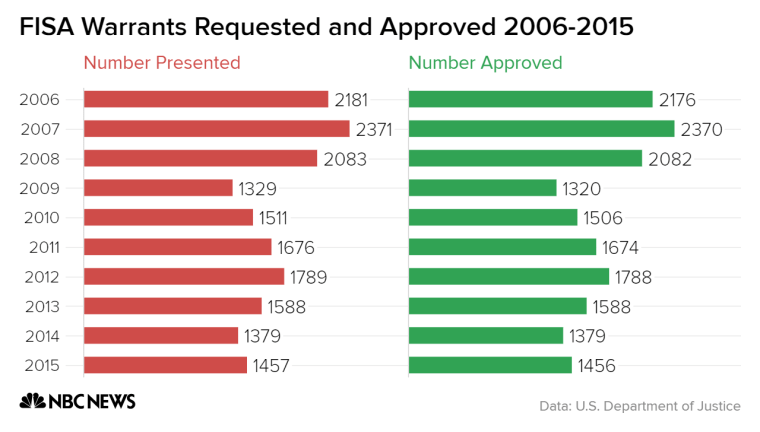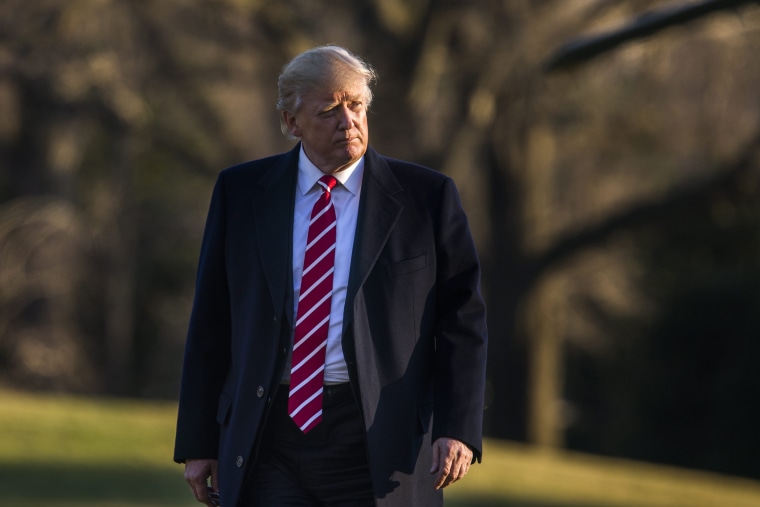President Donald Trump offered no evidence for his claims that former President Barack Obama wiretapped Trump Tower, which makes it quite difficult to provide legal context for the allegation.
As a factual matter, Obama officials deny he was involved in any wiretapping decision, and other government officials have said there was no wiretap of Trump Tower — though some wiretaps are secret, so it is possible that wiretaps would exist with very few people knowing about them.
Legally, however, there are basically two avenues for a warrant in the U.S.: A standard criminal warrant that targets a U.S. person and a foreign intelligence warrant that targets a foreigner. If either route were lawfully used to wiretap Trump associates, that would present potentially significant questions for the Trump administration.
Criminal Warrant
A typical criminal warrant would require investigators to provide probable cause that suspected criminal activity had occurred or would occur.
To introduce the type of surveillance Trump alleged, law enforcement would also be burdened with demonstrating that wiretapping a particular target and specific set of conversations would uncover illicit acts. In this situation, authorities are targeting someone inside the U.S. for potentially unlawful conduct.
Foreign Intelligence Warrant
Foreign intelligence warrants are quite different. They reflect intelligence goals, such as learning about foreign government activity, not typical domestic criminal enforcement actions. Authorities can get such a warrant by going to a secret court, the FISC, and proving to a designated national security judge that there is probable cause to target a foreign power or agent in pursuit of intelligence.
If this type of warrant pursued a U.S. person, however, then the authorities would have to prove that their target could be engaged in espionage. Domestic crimes alone would not be enough.
A Foreign Intelligence Surveillance Act, or FISA, wiretap would typically only pursue a foreign target who might have interacted with an American or a specific U.S. person who might have engaged in espionage.
The warrant process is secret and most FISA warrants are approved.

How Do Trump’s Claims Jibe with these Procedures?
Trump’s allegations that wiretaps had targeted him or his advisers do not fit the requirements for a FISA warrant — unless an associate was suspected of acting on behalf of a foreign government. The claims of scandal of “Watergate” proportions of political abuse would require either domestic warrants or illegal surveillance abused for election purposes, which the Trump White House has not supported with any evidence.
In other words, Trump may genuinely misunderstand the process for a lawfully obtained wiretap, or he may believe that illegal wiretapping occurred.
NBC News has not confirmed investigative surveillance of Trump’s campaign or transition team. Former Director of National Intelligence James Clapper said on Meet the Press on Sunday that he had no knowledge of a FISA court order to monitor Trump Tower.
An Obama spokesman flatly denied the claims about Obama being involved, calling them “unequivocally false,” but it is possible that some wiretaps exist which Obama was not involved in.
The discussion of potential wiretapping has percolated since January, when the Guardian first reported on the pursuit of a FISA warrant for Trump associates, a claim that has been repeated in outlets like Breitbart — a conservative website Trump has been known to read and which was led by Chief White House Strategist Stephen Bannon.
Potential Legal Scenarios
Because these allegations lack any evidence or specifics, it continues to be difficult to predict how this could shake out through a precise legal lens. Nevertheless, there are a few possible scenarios:
- There was a FISA warrant and it was issued because a judge found probable cause for espionage or surveilling contacts with foreign powers.
- A domestic normal warrant was issued because a judge found probable cause of domestic crimes.
- The allegations are false, no warrants were issues and no wiretapping occurred.
- Wiretapping occurred without a warrant for illegal political purposes — at this point, a conspiracy theory.
The first three potential situations are completely lawful and do not constitute a scandal for the applicable authorities. The fourth, however, would be an illegal scandal on par with Watergate.
There is no proof to corroborate any of the president’s allegations and the White House — while calling for a probe — did not indicate on Sunday that it would provide any evidence to prove Trump’s assertions. That leaves a heavy burden on Trump, who appears to have accused his predecessor of high crimes without any evidence or interest in investigating the claims himself.


